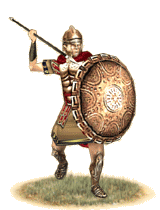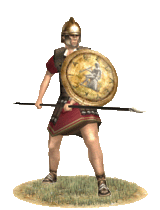Recruitment is limited by a) the level of the town and b) the class the unit is drafted from. A level 1 town (-2,000 inhabitants) can support one unit of each type, a level 2 town (2,000 – 6,000) can support two of each, level 3 three units, and so on. Each type can have maximum as many units as its class is from a single town. That would be, 5th class soldiers (all units that can be recruited from a level 1 barracks) can form a maximum of 5 units from each town, men from the 4th class (level 2 barracks) can at maximum field 4 units and so on to the 1st class (level 5 barracks) that can only field one single unit from each city where this type of unit can be recruited.
Example: Gund-î Paltâ are 5th class soldiers. They can form a maximum of 5 units from a single town, but only if that town is level 5 (24,000+ inhabitants). In a level 3 town (6,000 – 12,000) they can form up to three units.
Aznvakan Aspet are 1st class soldiers. They can always only form one single unit in every province they exist, but that already from the smallest village. Why? They are noblemen that hold large estates, large enough to provide them with the wealth they need to maintain their exclusive weaponry and fine horses. Their number in a single province can not be raised because that would require raising the number of estates by reducing the size of the existing ones. With smaller estates they would be no longer able to arm themselves as Kataphrakts.
The same goes for all classes of units: at least one of them can be recruited from each province but there is an overall limit. That means that population growth results first of all in the growth of peasant and levy soldiers. Elites are limited. The idea is also to make all units important even if they are pretty much the same by their stats. Kavakaza Sparabara would be Caucasian peasants, Pantodapoi Hellenized townsfolk. Both are of the same class and have about the same stats, but both are limited what might require recruiting them both at a time. Persian Hoplites are fine, but there can be no more than two per city that can raise them.
I do not keep track of the units’ whereabouts, only about the limit of each per town and how many had been raised there already. Once a unit is raised it might be used ad the king’s wishes, be it a garrison in its hometown, a part of the main army or a garrison elsewhere. When a unit is disbanded, annihilated or merged a province that has already raised units of this type and where not all of these are part of the local garrison gets back a “recruitment slot”.
The military budget is usually ½ of the overall income. If the other half produces a surplus after paying for construction, wages and the like, this can be used to pay for mercenaries.
The characters’ ranking is determined by their standing in the royal court. They get “points” according to the system “The King’s Favourite”. All characters that are of the same ethnicity as the king receive one point. His sons +5 points, grandsons, father, brothers +4 points, in-laws +3 points, uncles and nephews +2 points and cousins +1 point. The also get +1 point per every basic character trait they share with the king (sharp, charismatic, pessimistic, dull, vigorous, etc.). That would be a maximum of twelve points for being his son (+5), of the same ethnicity (+1 default as his son) and have all 6 basic traits the same as the king. To this is added (or subtracted) the character’s influence.
This results in a list, and when ever a post of provincial governor is vacant or an army needs a general the next “free” character from the list gets the job. Only when the king happens to be intelligent I also take a look at the character’s qualification and may pick the second or third form the list if he is really much more qualified for the task. Naturally not all characters do really want all jobs. Characters that are lively and optimistic, and don’t have any negative values in command, troop moral or hit points, in general prefer tasks that include a marital challenge, like an army command or governing a province bordering a hostile faction. Characters that are lazy and pessimistic and don’t have any positive values in military traits try to avoid these posts as much as possible. Characters that are not part of the stirps regia prefer to govern the province they came form or serve in an army that is commanded by an ethnic fellow of theirs.
Young boys of 16 usually start by visiting the royal school in Armavir until they are 20. Afterwards, or even occasionally during this time, they join the army to serve among the Khuveshâvagân, the king’s heavy cavalry. When the king seas them fit they might be given a province to rule. There they speak law in the king’s name, supervise the trade and mining, return taxes to the royal treasury, raise soldiers and enforce the king’s supremacy by crushing any resistance or uprising against the crown. Usually these commissions last a live time. In return these noblemen are required to join the king’s forces whenever he summons them. They are the backbone of his army.










 Reply With Quote
Reply With Quote




























Bookmarks